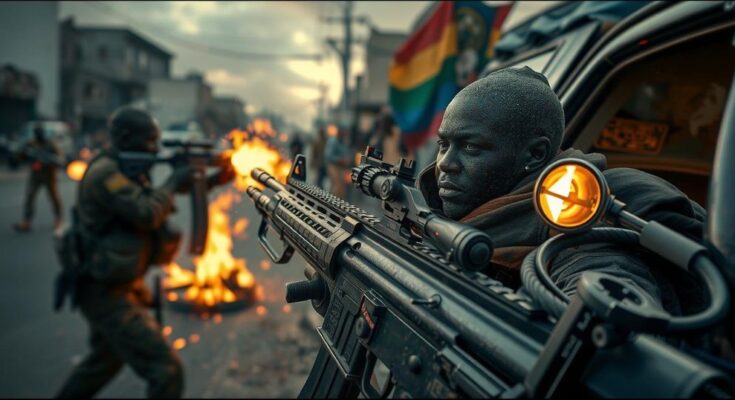Heavy gunfire erupted in Juba, South Sudan, as security forces attempted to arrest former NSS head Akol Koor Kuc. The shooting began at 7 p.m. local time and lasted over an hour, although Koor was reported to be unharmed. This incident follows Koor’s dismissal by President Salva Kiir, amidst ongoing power struggles and postponed elections.
On Thursday evening, substantial gunfire erupted in Juba, South Sudan, as security forces attempted to detain Akol Koor Kuc, the former head of the National Security Service (NSS). This incident, which occurred around 7 p.m. local time, was confirmed by reporters from Reuters and indicated in a safety alert sent to United Nations personnel. The intense shooting persisted for over an hour before subsiding. Despite the explosive reports, Major General Lul Ruai Koang stated that Koor had not been apprehended and remained in his residence during the conflict.
The situation follows President Salva Kiir’s recent dismissal of Koor, who had been serving since South Sudan’s independence in 2011. His replacement, a close ally of Kiir, underscores the ongoing power dynamics within the government. Analysts suggest that this event highlights a significant power struggle, especially in light of the recent postponement of elections initially slated for December.
The conflict in South Sudan is deeply rooted in a history of civil war marked by rivalry between factions loyal to Kiir and First Vice President Riek Machar, which resulted in a tragic loss of life. Although a degree of stability has prevailed since the end of active hostilities in 2018, flare-ups such as this one demonstrate the fragile nature of peace in the region. The current situation necessitates close observation to understand its implications for national governance and security.
South Sudan gained independence from Sudan in 2011, but its subsequent years have been marred by internal conflict, including a brutal civil war from 2013 to 2018. The power struggle between President Salva Kiir and First Vice President Riek Machar resulted in widespread violence and significant humanitarian crises. Even after forming a transitional government aimed at restoring stability, ongoing tensions often erupt into violence, as evidenced by the recent events in Juba. Governed under a fragile peace since the civil war’s conclusion, South Sudan’s political landscape remains volatile, with power shifts and factional conflicts commonplace.
The recent gunfire in Juba signifies more than just a security incident; it symbolizes the volatile political climate within South Sudan. The efforts to detain Akol Koor Kuc indicate significant governmental shifts, underlying rivalries, and the complexity of maintaining peace in a country still healing from past conflicts. With key elections delayed and tensions high, the situation warrants ongoing scrutiny to anticipate further developments and their potential impacts on national stability.
Original Source: www.usnews.com




